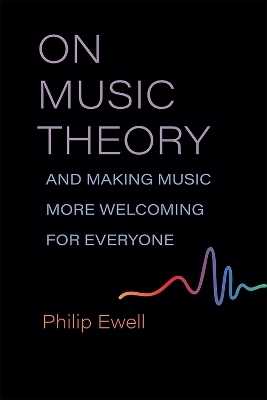
On Music Theory, and Making Music More Welcoming for Everyone
The University of Michigan Press (Verlag)
978-0-472-05502-9 (ISBN)
- Lieferbar (Termin unbekannt)
- Versandkostenfrei innerhalb Deutschlands
- Auch auf Rechnung
- Verfügbarkeit in der Filiale vor Ort prüfen
- Artikel merken
Since its inception in the mid-twentieth century, American music theory has been framed and taught almost exclusively by white men. As a result, whiteness and maleness are woven into the fabric of the field, and BIPOC music theorists face enormous hurdles due to their racial identities. In On Music Theory, Philip Ewell brings together autobiography, music theory and history, and theory and history of race in the United States to offer a black perspective on the state of music theory and to confront the field’s white supremacist roots. Over the course of the book, Ewell undertakes a textbook analysis to unpack the mythologies of whiteness and western-ness with respect to music theory, and gives, for the first time, his perspective on the controversy surrounding the publication of volume 12 of the Journal of Schenkerian Studies. He speaks directly about the antiblackness of music theory and the antisemitism of classical music writ large and concludes by offering suggestions about how we move forward. Taking an explicitly antiracist approach to music theory, with this book Ewell begins to create a space in which those who have been marginalized in music theory can thrive.
Philip Ewell is Professor of Music Theory at Hunter College of the City University of New York.
Acknowledgments
Intro: On Music Theory
Chapter 1: On Music Theory, Race, and Racism
Defining Music Theory
How Music Theory Has Dealt with Race in the Past
Race and Demographic Data in Music Theory
Race and Demographic Data in Music Theory Textbooks
Final Thoughts on “On Music Theory, Race, and Racism”
Chapter 2: On White Mythologies
Whiteness
White Supremacy
Western Civilization and Origin Myths
The Western Canon in Music
One Example of How the Western Canon Discriminates
How the Western Canon Creates Racist Policies: The Foreign-Language Requirement
Epistemological Ignorance
Final Thoughts on “On White Mythologies”
Chapter 3: On Heinrich Schenker and His Legacy
Schenker’s Racism
Whitewashing Schenker
Reframing Schenker
How Schenker’s Racism Affects His Music Theory
Schenker’s Sexism
Teaching Schenker
Final Thoughts on “On Heinrich Schenker and His Legacy”
Epilogue to Schenker and His Legacy
Chapter 4: On Volume 12 of the Journal of Schenkerian Studies
White Stories, Black Histories, My Testimony
Background
Racism in Volume 12
Music Theory’s Assimilationism
The Ten Core JSS Response Authors
Reactions to the JSS Affair
Final Thoughts on “On Volume 12 of the Journal of Schenkerian Studies”
Chapter 5: On Music Theory’s Antiblackness
The Society for Music Theory’s Outstanding Publication Awards
How Music Theory Online Tried to Suppress Publication of “Music Theory and the White Racial Frame”
Other Examples of Music Theory’s Antiblackness
Final Thoughts on “On Music Theory’s Antiblackness”
Chapter 6: On Classical Music’s Antisemitism
Differences Between Antisemitism and Racism
Examples of Antisemitism in Classical Music
Overcontextualizing Antisemitism
Antisemitism and Divisiveness in Music Theory
Recommendations for Confronting Classical Music’s Antisemitism
Final Thoughts on “On Classical Music’s Antisemitism”
Outro: On a Path Forward and Music Theory’s Future
The 1855 Project
Recommendations
Final Thoughts on On Music Theory
Bibliography
| Erscheinungsdatum | 05.05.2023 |
|---|---|
| Reihe/Serie | Music and Social Justice |
| Zusatzinfo | 3 examples, 5 tables |
| Verlagsort | Ann Arbor |
| Sprache | englisch |
| Maße | 152 x 229 mm |
| Themenwelt | Kunst / Musik / Theater ► Musik ► Musiktheorie / Musiklehre |
| Sozialwissenschaften ► Ethnologie | |
| Sozialwissenschaften ► Soziologie | |
| ISBN-10 | 0-472-05502-X / 047205502X |
| ISBN-13 | 978-0-472-05502-9 / 9780472055029 |
| Zustand | Neuware |
| Haben Sie eine Frage zum Produkt? |
aus dem Bereich


